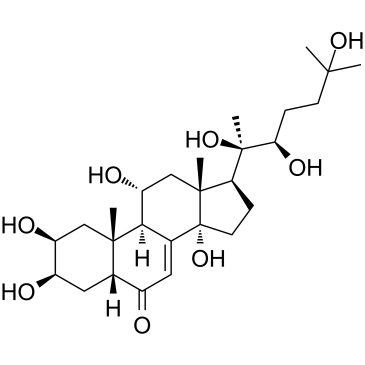Turkesterone
Modify Date: 2024-01-03 11:16:35

Turkesterone structure
|
Common Name | Turkesterone | ||
|---|---|---|---|---|
| CAS Number | 41451-87-0 | Molecular Weight | 496.634 | |
| Density | 1.3±0.1 g/cm3 | Boiling Point | 740.1±60.0 °C at 760 mmHg | |
| Molecular Formula | C27H44O8 | Melting Point | N/A | |
| MSDS | N/A | Flash Point | 415.3±29.4 °C | |
Use of TurkesteroneTurkesterone, isolated from Ajuga turkestanica, is a potent ecdysteroid. Turkesterone acts as an ecdysteroid receptor (EcR) agonist in some insect systems[1]. |
| Name | turkesterone |
|---|---|
| Synonym | More Synonyms |
| Description | Turkesterone, isolated from Ajuga turkestanica, is a potent ecdysteroid. Turkesterone acts as an ecdysteroid receptor (EcR) agonist in some insect systems[1]. |
|---|---|
| Related Catalog | |
| Target |
Ecdysteroid receptor (EcR)[1] |
| In Vitro | The ability of Turkesterone to displace [3H]ponA from in vitro-expressed DmEcR/DmUSP receptor complex is assessed. The EC50 is 0.8 μM in the BII bioassay, Ki value is 90 nM in the receptor assay[1]. |
| References |
| Density | 1.3±0.1 g/cm3 |
|---|---|
| Boiling Point | 740.1±60.0 °C at 760 mmHg |
| Molecular Formula | C27H44O8 |
| Molecular Weight | 496.634 |
| Flash Point | 415.3±29.4 °C |
| Exact Mass | 496.303619 |
| PSA | 158.68000 |
| LogP | -1.53 |
| Vapour Pressure | 0.0±5.5 mmHg at 25°C |
| Index of Refraction | 1.610 |
| Storage condition | 2-8°C |
| TURKESTERONE(SH) |
| (2β,3β,5β,11α,22R)-2,3,11,14,20,22,25-Heptahydroxycholest-7-en-6-one |
| (2beta,3beta,5beta,11alpha,22R)-2,3,11,14,20,22,25-Heptahydroxycholest-7-en-6-one |
| Cholest-7-en-6-one, 2,3,11,14,20,22,25-heptahydroxy-, (2β,3β,5β,11α,22R)- |

